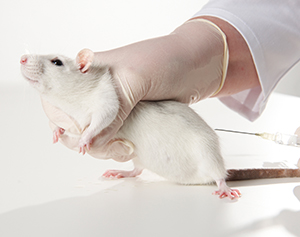2017 figures show Government is still failing to control animal cruelty in Irish laboratories
The Irish Government has revealed another increase in the number of animals subjected to painful tests in the country’s laboratories. In 2017 there was a 7% rise in experiments to 242,302, compared with 226,934 in 2016. The expanding death toll is being driven by the most severe and controversial toxicity tests for botox-type products, which went up by over 24,000 to 194,247 in 2017.
The number of tests categorised at the highest level of suffering – ‘severe’ - also increased by more than 4,000 to 70,596. Therefore, in terms of animal suffering per capita, Ireland continues to be the ‘cruel man of Europe’. Yet the Health Products Regulatory Authority (HPRA) – the designated ‘competent authority for enforcing animal testing regulations claims it is focussed on reducing severe suffering and on applying the 3Rs – reduction, replacement and refinements of experiments. So the agency is failing to perform its most basic functions to protect animals.
The mouse is the species that suffers most, enduring 206,908 tests, mostly to assess the toxicity of batches of botox-type products. Other animals subjected to experiments include rats, rabbits, dogs, pigs, ferrets, horses, sheep, cattle, birds and fish.
The statistical report also reveals disturbingly weak inspection practices by the Health Products Regulatory Authority, with only 6 out of 33 inspections of laboratories being unannounced. At this rate, on average each laboratories only receive a surprise inspection about every 5 years.
The IAVS is both exasperated and appalled by the increasing toll of animal suffering in Irish laboratories. The HPRA claims it is committed to reducing painful animal experiments – but things are getting worse, not better. Across government there is a culture of indifference to animal cruelty combined with a craven desire to attract any business to Ireland, no matter how barbaric its treatment of animals.
The IAVS proposes two urgent actions:
1. The Government, at the very least, needs to follow other EU states and establish a centre to coordinate and promote humane alternatives to animal tests
2. Consumers need to check whether their botulinum toxin injections have been tested on animals or tested using safer, cruelty-free non-animal technologies.


